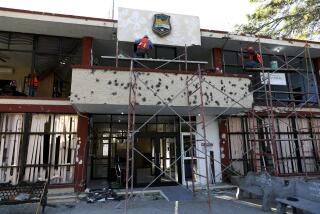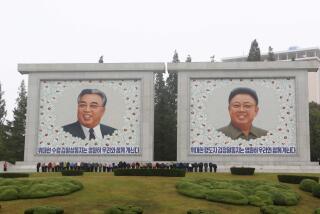U.S. to Challenge Soviets on Nicaragua Arms
- Share via
MEXICO CITY — The United States will challenge the Soviet Union this week over what U.S. officials charge is an unkept promise by Soviet President Mikhail S. Gorbachev to stop arms deliveries to Nicaragua, aides said Sunday.
Gorbachev told President Bush in a letter in May that the Soviet Union had responded to U.S. complaints by cutting off its supply of weaponry to Nicaragua’s Marxist regime.
But officials traveling to Mexico with Secretary of State James A. Baker III said that while Soviet arms shipments have dropped, arms deliveries from East Germany, Cuba and other Soviet Bloc nations appear to have increased markedly, leaving the overall level of shipments slightly higher.
“There is a perplexing coincidence between the drop in Soviet shipments and the increase from the rest of the Soviet Bloc,” one senior official said.
Another official said that the assistant secretary of state for inter-American affairs, Bernard W. Aronson, will demand an explanation of the shipments when he meets in London this week with Yuri I. Pavlov, a Soviet deputy foreign minister and Latin American specialist.
Nicaragua depends entirely on the Soviet Bloc to equip its 65,000-member army, the largest in Central America. The United States has long asked the Soviet Union to reduce its support for the ruling Sandinistas but until May had received no positive response.
Since Gorbachev’s letter, they said, there have been encouraging signs from Moscow of a willingness to cooperate with the United States in the region--but few, if any, concrete acts.
While Soviet deliveries of guns and ammunition to Nicaragua appear to have stopped, one official said, the Soviet Union is still delivering helicopters and other militarily-useful equipment to Managua.
And in neighboring El Salvador, arms shipments from Cuba to the Marxist-led guerrillas have increased significantly in recent months, several officials said.
Baker discussed the issue with Soviet Foreign Minister Eduard A. Shevardnadze in Paris on July 29 but received no satisfactory reply, officials said. In the wake of that exchange, Baker directed Aronson to bring up the issue more strongly in his meeting with Pavlov this week.
Soviet policy toward Nicaragua is regarded by many Bush Administration officials as a key test of Gorbachev’s claim of “new thinking” in Soviet foreign affairs.
Baker arrived in the Mexican capital Sunday night, heading a delegation of record size--41 U.S. officials, including five Cabinet members--for meetings with Mexican leaders that will deal with subjects ranging from debt relief to Tijuana sewers.
The secretary of state hailed the new, more cooperative atmosphere in U.S.-Mexican relations that has followed the inauguration of President Carlos Salinas de Gortari last year.
“The relationship (between the United States and Mexico) used to be characterized as one of managing irritants,” Baker said. “We’d like to build one that could be characterized as creating common opportunities.”
More to Read
Sign up for Essential California
The most important California stories and recommendations in your inbox every morning.
You may occasionally receive promotional content from the Los Angeles Times.














